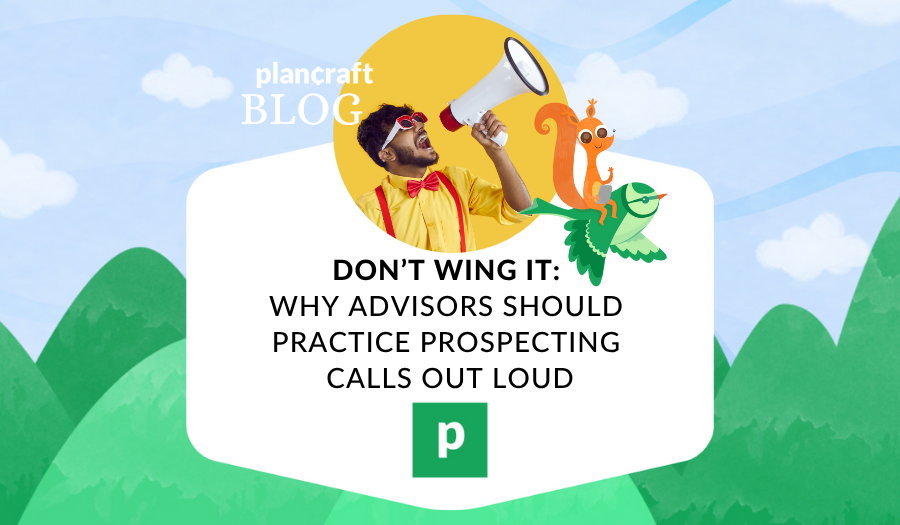It sure feels like folks don’t pick up their phones the way they used to, doesn’t it? Culture is changing, and peoples’ phone habits are changing with it. No longer do we live in a time where a phone call was enough of a novelty that people would answer anything that came through.
Now, in the era of text messages and spam call robots, people are more skeptical than ever about getting an actual phone call on their phone. Which, of course, leaves prospecting financial advisors in a bit of a pickle: how do you get the person on the other end of the line to actually talk to you?
Fear not: Mary Jane Copps (a.k.a. “The Phone Lady”) is an expert on communicating over the phone, and she just happened to lead a webinar for Planswell advisors on how to leave messages that are more likely to get returned. I attended, and will be spilling all the secrets in the paragraphs that follow.
Stick around for a crash course on leaving excellent messages that will get you more calls back than you could ever expect.
The world we live in
Before we dive into the actual tips and strategies we can use to ensure folks return the messages we leave them, there are a few realities of contemporary society and culture that are important to keep in mind:
First, we must understand it is our responsibility as callers to ensure the people we are calling both hear us and understand us. The Phone Lady quotes Frances Hesselbein, who says “communication is not saying something; communication is being heard,” as a means of illustrating this point. This, of course, leads to the question “how can I communicate with someone who doesn’t pick up their phone?”
Fair point: long gone are the days when you could rely on a person to check their messages consistently every time they returned home. Now, when peoples’ phones are on them at all times, we never know when someone is going to check their messages, and we never really know when, or even if, they might call us back.
Despite this, The Phone Lady points out when you get someone to take action and actually call you back, “they are less defensive, more relaxed, and have an increased likelihood of booking the next step.”
The advice
In order to establish trust with your households and encourage more call backs, The Phone Lady has the following advice:
1. Expect to leave a message: despite the fact that everyone’s phone is in their pocket or purse at all times, that does not mean they are going to pick it up when you call. Quite the opposite, in fact. The advent of text culture and the fact there are so many spammy telemarketing robots around means people are more skeptical than ever about incoming calls from numbers they don’t recognize.
Of course, you should always be prepared for the person you’re calling to pick up (and be absolutely delighted when they do).
2. Don’t leave comprehensive details in your messages: the one thing that’s going to motivate the person you’re calling to return the call is their own curiosity, which you must ignite by the message you leave. If you give all of the details in the message itself, you’ve removed any possibility that they will be curious about why you’re calling, and they are much less likely to call back.
3. Your tone of voice matters: because you aren’t communicating face to face, tone of voice becomes the way that the folks you’re calling get a sense of what kind of person you are. So, if you sound rushed or stressed, nobody is going to want to engage in a conversation with you. A warm, reassuring tone, on the other hand, is a great way to begin to build trust and establish a relationship with someone you’ve never met (or even seen).
Be aware of how you sound on the phone and, if all else fails, always demonstrate respect for the person you’re calling.
4. Always leave a message: maybe this seems like a no-brainer, but lots of people don’t do it. The problem with not leaving a message is that’s the kind of thing spammy telemarketers do — which you’re not.
What’s more, you want to develop a relationship with the person you’re calling and begin to build trust; that’s never going to happen if you don’t give them an opportunity to hear your voice and see that you are warm and caring and here to help.
5. It’s not rude if they don’t call you back: just because someone doesn’t call you back, it doesn’t mean they hate you personally or will never book a next step with you. In fact, it’s often not personal at all. People are busy, sometimes they get overwhelmed. It’s quite likely that the person you’ve called actually wants to call you back and has forgotten or hasn’t had the chance to do so yet. Don’t let the fact they haven’t returned your call get in the way of you reaching out.
6. Avoid phone tag: the typical “ha ha, you’re it” message that gets left after the third missed call between two people belies the fact that repeatedly calling and missing someone else is incredibly frustrating. If the person you’re calling is already frustrated before you’ve even had the chance to speak to them, you’re not doing yourself any favors in terms of setting yourself up for success.
So, in order to avoid playing phone tag with your households, be sure to provide clear and detailed information about when you’ll be available if they’d like to call you back.
7. Have a “quick question”: this is the best way to inspire curiosity in the people you call. In fact, The Phone Lady has found that saying the phrase “I have a quick question for you” in your message increases call backs by 25%.
Of course, it’s important for you to actually have a quick question for when they do call you back. It should be something open-ended that will get a conversation started. Here are some examples of good “quick questions”:
- What inspired you to fill out this questionnaire?
- How did filling out the questionnaire impact how you think about your financial situation?
- What questions do you have about how you can improve your financial situation?
- What are your short- and long-term financial goals?
8. Follow up via email: if you have an email address for the person you’ve left a message for, you could follow your message up with an email. (You should also say you’ll be doing that in your message.)
When you do send the email, use something along the lines of “Re: My Voicemail From Earlier” as the subject line. The “Re:” will often get your message past any spam filters that might be active.
What’s more, you should send the email right away after you leave the message. This way, if they happen to check their messages immediately, they will see you followed through on your commitment to reach out via email, which helps to establish trust before you speak with them.
9. Persistence is not pestering: in fact, persistence is often necessary for success. Wouldn’t you want your doctor to be persistent? Know that what you have to offer is of value to the households you’re calling, and do your due diligence to ensure they are able to take advantage of you as a resource.
Of course, you don’t want to spam someone with calls every ten minutes. The Phone Lady recommends leaving at least five messages over the course of two and a half weeks. If you’ve left five messages with still no call back, be sure to leave the door open in the last message. Say something along the lines of, “I’ll be available if you ever want to connect,” so they know they can still call you back.
10. Smile before you dial: does this sound corny? Is it overused in sales training? Yes and yes. However, it’s actually good advice. When you smile, you activate muscles in your face that will change your tone of voice, making it more warm, welcoming, and calm.
11. Use an appointment app: apps like Calendly are a great tool for you to provide to the households you call because it makes scheduling an appointment with you extremely easy. They may even do so without actually calling you back.
12. Update your voicemail daily: your own voicemail should indicate your desire to be of service to those who call you back. To that end, it’s a great idea to record a dated voicemail every day. This way, if someone calls you back while you’re on the phone with someone else, they know you’re working today and will be checking your messages.
You also want to ensure you say your name clearly on your voicemail. This will help those who call you get to know you a little better before you even have the opportunity to speak to them.
Again, tone is of the utmost importance. Your voicemail message should be warm and welcoming.
Action plan
If you employ these 12 pieces of wisdom, you’re basically guaranteed to increase your callback rate. Of course, knowing what to do and actually doing it are two different things entirely. Here’s a quick action plan you can put into place to get things started:
- Practice your script
- Leave clear, energetic voicemail messages
- Be persistent (it’s not pestering, remember!)
- Try out a few different “quick questions” and see which works best for you
- Update your voicemail message daily
- Pay attention to your tone of voice while on the phone (it may even be worthwhile to record your calls and listen back to them so you can hear how you sound)






-2.png)


